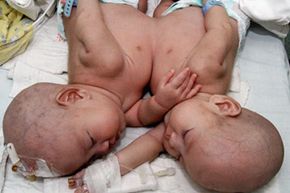Has your life ever felt incomplete? Not in a way that you could put your finger on, the way some people might bemoan the lack of a spouse or a sports car. Rather, something has always felt missing. Have you made up a secret, indecipherable language yet never had someone to speak it with? If so, you might have had a vanishing twin.
Though it sounds like a Stephen King title, vanishing twins are actually quite common. Researchers estimate that 1 in 8 pregnancies involve twin fetuses, yet only 1 in 80 pregnancies actually ends in the birth of twins [source: Goldman]. What happens to all those unborn twins? They die very early in the pregnancy and are simply reabsorbed by the mother's body. Spotting in the first trimester can be an indication of this occurrence.
Advertisement
A study published in 2007 found that surviving twins, the ones that go on to a solo role in the birth show, are unaffected developmentally by the other twin's disappearance, though Internet searches reveal numerous support groups for those who feel they are missing their other half [source: Anand et al.]. In 2005, American cyclist Tyler Hamilton was accused of blood doping, a process in which athletes boost performance by using another person's blood; as his defense, Hamilton claimed that the other blood cells must have been left by his vanishing twin [source: Kolata]. Hamilton was suspended from the sport anyways.
Hamilton's case could be a humorous example of sibling rivalry gone too far; after all, though Jan Brady felt she lived in her sister Marcia's shadow, she never pinned her troubles on a vanishing twin. But Jan Brady -- and even Peter Brady -- may be concerned to learn some of those twins don't disappear entirely. Rather, they become absorbed inside their womb mate. With the rate of vanishing twins so common, you have to wonder: Am I carrying my own twin?
Advertisement


